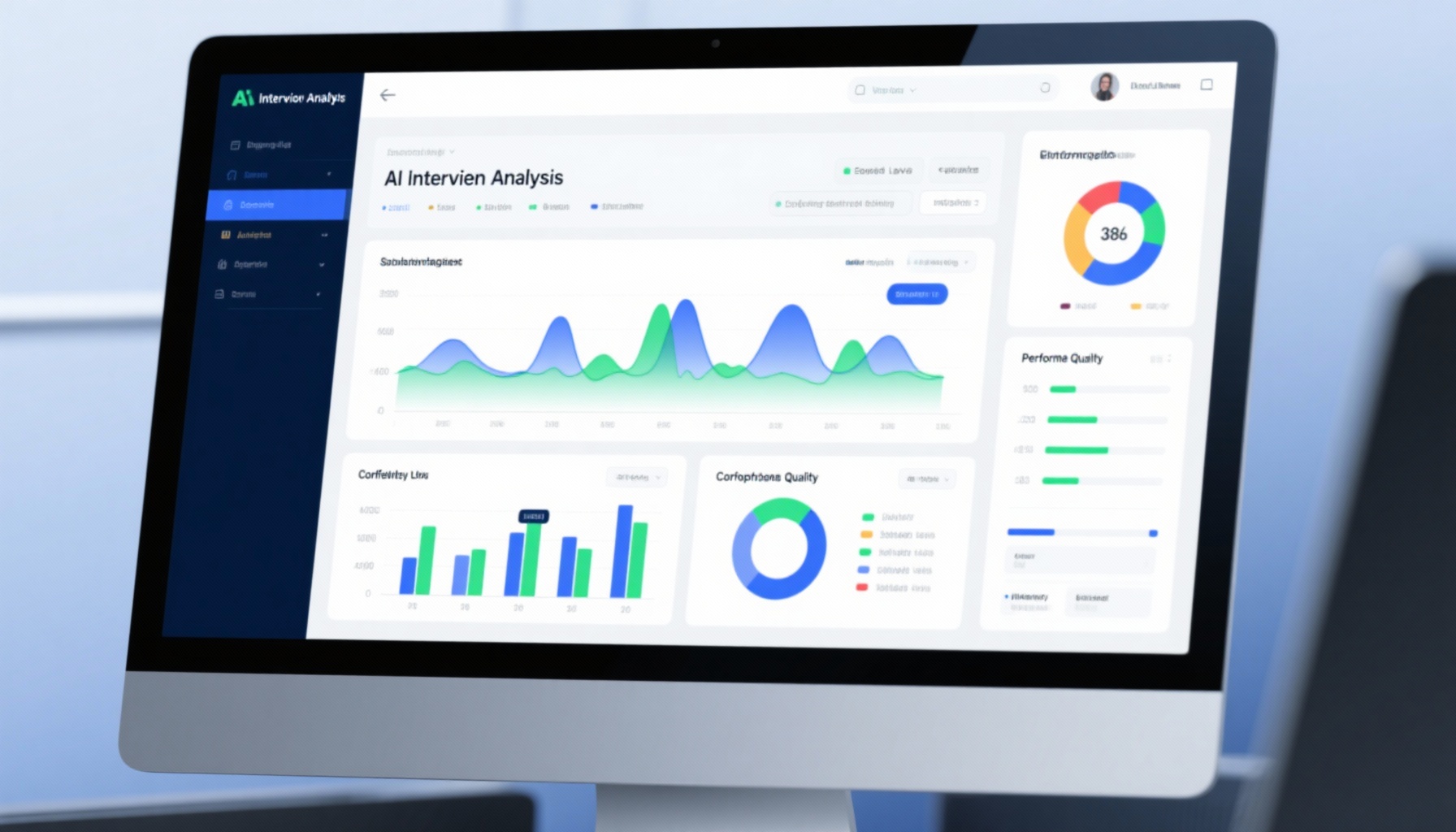AI Job Interviews: Your Ultimate Guide to How They Work & How to Win in 2025
Facing an AI interview? This ultimate guide reveals how an interview with AI works, common mistakes to avoid, and strategies to win your next job in 2025.

The job interview landscape has undergone a dramatic transformation. What once involved a handshake, eye contact, and reading the room now increasingly means facing a screen and speaking to an artificial intelligence. If you're feeling anxious about this shift, you're not alone. AI interviews have become a standard part of the hiring process for many companies, and understanding how to navigate them effectively can be the difference between landing your dream job and getting filtered out before you even speak to a human.

What Exactly Is an AI Interview?
An AI interview is a structured conversation between you and an artificial intelligence system designed to evaluate your qualifications, communication skills, and cultural fit for a role. Unlike traditional interviews, these systems use sophisticated algorithms to analyze multiple aspects of your performance simultaneously.
The typical AI interview experience includes:
- Video-based responses where you speak to your camera while the AI records and analyzes your answers
- Predetermined questions that are consistent across all candidates
- Time-limited responses, usually ranging from 30 seconds to 3 minutes per question
- Multiple evaluation criteria including speech patterns, word choice, facial expressions, and content quality
The technology behind these systems is more sophisticated than many people realize. Modern AI interview platforms don't just look for keywords—they analyze your tone of voice, speaking pace, confidence levels, and even facial micro-expressions to build a comprehensive profile of your candidacy.
How AI Systems Actually Evaluate You
Understanding the evaluation criteria is crucial for success. AI interview systems typically assess candidates across several key dimensions:
Content Analysis
The AI examines the substance of your answers, looking for relevant experience, specific examples, and clear problem-solving approaches. It's trained to recognize industry-specific terminology and evaluate whether your responses directly address the questions asked.
Communication Quality
This goes beyond just what you say. The system analyzes:
- Clarity and articulation - Can you express ideas clearly?
- Conciseness - Do you provide focused answers or ramble?
- Structure - Are your responses organized logically?
- Confidence indicators - Steady pace, minimal filler words, and decisive language
Behavioral Indicators
Advanced systems can detect enthusiasm, stress levels, and authenticity through vocal patterns and facial expressions. They're looking for consistency between your words and your non-verbal communication.

Common Mistakes That Get Candidates Filtered Out
Many qualified candidates fail AI interviews not because they lack the skills, but because they don't understand how to communicate effectively with the system. Here are the most critical mistakes to avoid:
Over-Explaining and Rambling
Human interviewers might appreciate context and storytelling, but AI systems are trained to identify concise, direct answers. When you ramble or provide excessive background information, the algorithm may interpret this as uncertainty or lack of focus.
Using Too Many Filler Words
"Um," "uh," "like," and "you know" are natural in human conversation, but AI systems flag excessive use of these words as indicators of nervousness or unprofessionalism. For instance, a tool like AceRound can provide real-time feedback during a practice session, flagging when you ramble or use too many filler words, helping you train yourself to be more concise for the real AI interviewer.
Failing to Address the Question Directly
AI systems are programmed to detect whether you actually answered what was asked. If you pivot too quickly to a different topic or provide a generic response that could apply to any question, the system will score you poorly.
Speaking Too Quickly or Slowly
Extreme pacing in either direction can trigger negative evaluations. The AI is calibrated to recognize confident, professional speaking patterns, which typically fall within a moderate pace range.
Your Strategic Preparation Framework
Success in AI interviews requires a different preparation approach than traditional interviews. Here's your comprehensive strategy:
Master the STAR-AI Method
Adapt the classic STAR method (Situation, Task, Action, Result) for AI evaluation:
- Situation: Provide just enough context (15-20 seconds)
- Task: Clearly state your responsibility (10-15 seconds)
- Action: Detail your specific actions with concrete examples (45-60 seconds)
- Result: Quantify the outcome whenever possible (15-20 seconds)
This structure gives the AI clear markers to evaluate your response while keeping you within typical time limits.
Practice Vocal Clarity and Pacing
The best way to overcome the awkwardness is to simulate the experience. This is where an AI interview copilot is invaluable. Using AceRound for unlimited mock interviews lets you get comfortable with the format and receive the same kind of data-driven feedback the real systems use, pinpointing areas for improvement before it counts.
Key vocal techniques:
- Speak at a moderate pace (around 150-160 words per minute)
- Use clear enunciation, especially for technical terms
- Vary your tone to show enthusiasm and engagement
- Practice smooth transitions between ideas
Prepare Concise, Specific Examples
Create a bank of 8-10 detailed examples that showcase different skills and experiences. Each example should be:
- Specific with concrete details and metrics
- Relevant to common interview questions in your field
- Memorable with unique elements that set you apart
- Adaptable to multiple question types

Technical Setup for Success
Your technical preparation is just as important as your content preparation. AI systems are sensitive to audio and video quality, which can impact your evaluation.
Optimize Your Environment
- Lighting: Position yourself facing a window or use a ring light to ensure your face is clearly visible
- Audio: Use a quality headset or external microphone to ensure clear voice capture
- Background: Choose a clean, professional background or use a virtual background if necessary
- Internet: Test your connection speed and have a backup plan
Test Your Technology
Most AI interview platforms offer practice sessions. Take advantage of these to:
- Familiarize yourself with the interface
- Test your audio and video quality
- Practice with the time constraints
- Get comfortable with the format
During the Interview: Execution Strategies
When you're in the actual AI interview, these tactical approaches will help you perform at your best:
Start Strong
Your opening 10-15 seconds set the tone for the entire response. Begin with confidence, make eye contact with the camera, and start speaking immediately when the recording begins.
Use Strategic Pausing
While you want to avoid excessive filler words, strategic pauses can actually work in your favor. They demonstrate thoughtfulness and help you organize your thoughts before speaking.
Maintain Energy Throughout
AI systems can detect when your energy drops. Stay engaged and enthusiastic, especially in longer interviews with multiple questions.
End Decisively
Conclude each response with a clear, confident statement rather than trailing off. This signals to the AI that you've completed your thought.
Turning AI Interviews Into Your Advantage
Rather than viewing AI interviews as an obstacle, consider them an opportunity. These systems evaluate all candidates using the same criteria, which means success comes down to preparation and execution rather than subjective factors or interview bias.
Key advantages of AI interviews:
- Consistency: Every candidate gets the same questions and evaluation criteria
- Objectivity: Your responses are evaluated on merit, not unconscious bias
- Preparation opportunity: You can practice extensively with similar systems
- Performance focus: Success depends on your ability to communicate clearly and concisely

Your Next Steps to AI Interview Mastery
AI interviews are becoming the new standard, and mastering them is no longer optional—it's essential for career advancement. The key is understanding that these systems aren't trying to trick you; they're designed to identify candidates who can communicate their value clearly and confidently.
Remember: AI interviews are not about tricking a robot; they are about clearly and concisely demonstrating your core qualifications. By understanding how the system evaluates candidates and by practicing your delivery, you can turn this intimidating process into a powerful advantage that showcases your strengths.
The difference between candidates who succeed and those who get filtered out comes down to preparation and practice. Reading about it is one thing, but building muscle memory is key. To put these strategies into practice and get instant feedback on your performance, you can run through unlimited free mock interviews with AceRound.
Ready to master AI interviews? Start practicing today with AceRound's AI interview copilot. Get real-time feedback, build confidence, and transform your next AI interview from a source of anxiety into your competitive advantage. Your dream job is waiting—and now you have the tools to get it.



